Atlanta’s True Blossom sounds like the scent of an orange tree wafting in the springtime breeze. The sophisti-pop band’s second album, last year’s IN BLISS, pulls from the synth-y sounds of disco, funk, and lounge music, but uses ornate arrangements to keep their songwriting lively, singular, and deeply fun. Merry-Go-Round had the pleasure of chatting with the band about putting out a record during COVID, the Georgia scene, and some of their favorite pre-pandemic tour memories. Make sure to snag a copy of IN BLISS on Bandcamp today courtesy of Citrus City Records.
How did the band form and what were some of your motivations to start True Blossom?
Chandler Kelley: I had a previous band that I mostly wrote the tunes for and that band broke up because a member moved away. There’s a lot of bands in Atlanta that play similar genres and I basically approached members of my favorite bands. Me and Sophie have known each other for a very long time and that’s a different story, but Nadav was in this band called Bitter and also in a band called Newark Wilder. Adam was in a band called Twin Studies and was in a band called Flower previously and I just liked all those bands. We had an old member for a while, Jameson, who moved away and was in a band called Pop Weirdos. Then when he left, Bonnie joined because Bonnie was also in a band that we played shows with and liked.
So with your previous bands, what type of music were you making?
CK: The last band I had used a drum machine and it was dreamier, so this is more of a live thing. I would say this is more influenced by funk and disco, whereas my previous band was very British new wave-influenced. The same time period, but much more synthesizers—more dreamy and less funky.
I read Bonnie joined in the middle of recording. I’m curious what some of the challenges that having someone joining a band in the midst of making a record are, if there are any.
Bonnie Hardie: I did not have a lot to do with this record, which isn’t a challenge but it is a little sad. It’s a really good record and I think it sounds great, but I’m happy about the part that I played in it. I think this band is unique in that it’s very sweet people who do a lot of check-ins. I think that came through a lot in the recording process too. They made me feel very included. All of the synth stuff was Jameson and other people, not me, but I did sing a little on this record and that was super fun.
The main challenge was, when I first joined, we had to go on tour—that’s why I joined. There was, like, a week or two before they went on tour and that’s when I learned all of the songs. But even that was super fun. Things that have been challenging in the past with other groups I’ve been a part of haven’t been as much (with True Blossom), and I think that has a lot to do with my band mates being awesome people and very considerate.
CK: An important part of it is that Jameson didn’t leave acrimoniously. He went to graduate school and let us know months in advance, basically when we started booking the tour that Bonnie was talking about. So we finished tracking all of his synth parts and none of it was a surprise. We got all his parts recorded and then we started working with Bonnie. Everything we did when Bonnie started was for the next album.
True Blossom has a really modern edge to your songwriting, but a lot of your sound is driven by super retro synthesizers. I’m curious who some artists and movements you look to for musical inspiration are.
Nadav Flax: I play bass and when we were making this record I was listening to a ton of ‘70s and ‘80s dance music all the time. That was a big influence for me, and Patrice Rushen is one of my favorite artists. I just loved her playing on everything, so that’s where a lot of the dancey vibes are coming from. Another big funk influence was, like, S.O.S. Evelyn “Champagne” King was our jam for a minute.
CK: The biggest influence for when I’m writing the tunes is sort of this period of time in England in the ‘80s, like, Orange Juice, The Blue Nile, INXS, like, that kind of pop music made with guitars. The Smiths would even be a part of this, and also, like, Prince and Madonna. A lot of my guitar playing is influenced by the guitar playing on Madonna songs. Those are big reference points for writing. I know Jameson, even though he’s not here, is influenced by a lot of ‘70s synthesizer stuff. He listens to a lot of Brazillian, like, tropicalia. But also, like, the guy from Soft Machine…
BH: Robert Wyatt…
I didn’t really think of it when I listened to either of your records, but I do hear the Orange Juice influence now that you mention it.
CK: That band is maybe the best example of the kind of bands that I like.
Merry-Go-Round isn’t really, like, a “gear nerd’ type of publication, but I feel like a defining aspect of your sound is the musical palette you employ. I’m curious what pieces of equipment are integral to your sound, and specifically what synths you use. As a dude who likes synths, the synths on the record are really fun.
CK: You’re about to be really disappointed. Mostly Yamaha DX-7, a lot of the stuff that isn’t a DX-7 is a Microkorg and a Casio CZ100. It’s a little FM synth by Casio that runs on batteries. And then we went over to my friend’s house to record some synths. He has some actual analog and even some modular synths. He owns a Roland Juno and we used to Juno to get some string sounds, but mostly what we used was this little box he found in a house that had burned down that’s a preset-only box that was mostly used for soundtracking in the ‘80s and ‘90s. It’s a total piece of trash.
As far as guitar and bass, the guitar is just a Fender Stratocaster into a chorus pedal. As far as bass, Nadav doesn’t use any pedals. It’s just his fingers and a Fender Jazz Bass. There’s nothing to describe about our gear. It’s completely dirt stupid.
I feel like you capture it well, then.
BH: I play a Sequential Circuits Prophet but it’s not on the record. Adam, what don’t you have?
Adam Weisberg: I use two kits on that record and a few different snares. I use an old vintage Ludwig from the ‘60s, which is my main rock kit. That probably made it on four songs. And then I used this more contemporary Gretsch kit with clear heads and a lot of attack when I was going for more Michael Jackson-style punchy and bright drums. I don’t even know what cymbals I used, but I tried a lot of different snares and cymbals on the record to see what would fit for the song. What’s the song that I put the windchimes on?
CK: “Kaiju!” You used that weird go-go bell set.
AW: There was more room to experiment with that kind of stuff on this record. “Kaiju” is the song that I was able to experiment the most with different shit lying around.
Despite being a collection of indie songs, I feel like all of the songs on IN BLISS have an impressive and complex quality to their arrangements. I’m intrigued and impressed with the songwriting, specifically on “Cruel” and “Just Us 2.” I’m curious how long it takes you to write a song as a band and if you have any insight as to what your musical process is.
CK: I write the chords and the melodies to a certain extent, but we arrange them as a group. I don’t know what the groove is going to be until I get in front of everyone, but I feel like it happens quick. I don’t even necessarily remember arranging some of these songs. I remember writing them.
NF: Chandler always brings us the basic building bricks for the song, and gives us pointers and references to what kind of sound he’s going for and then we’ll kinda loop parts and add and tweak what we’re playing and see if it meshes well together. I feel like we naturally go to the same places, so I feel like we’ve gotten good at meshing together and anticipating some stuff. It’s definitely the best group project I’ve ever been on.
CK: “Just Us 2,” I feel specifically happened really fast. That’s the first bassline Nadav tried and then me and Jameson are playing in unison, just playing the chords, and there’s your arrangement. The long outro to “Just Us 2,” Sophie wrote that melody.
Sophie Cox: I was going to say that.
CK: She wrote the [hums outro melody] over the riff and just sang it into her phone and texted it to me. Me and Jameson figured out how to harmonize it for that long outro, but that’s just something Sophie wrote in her head while we were arranging it.
I feel like a big part of your identity is being a band who tours a lot. I hate to bring it up because I feel like it’s so cliche at this point, but how have you been staying active promoting your new record when touring is not an option.
SC: It’s hard. I think we all wish we could tour. We don’t even practice right now, which is pretty hard. We were in the middle of writing our next album. By this time we probably would have been ready to record that, but we haven’t practiced since March. We watched all these things we had booked get cancelled. It’s hard to know when we’ll be practicing, and also knowing when we’ll play again and where. A lot of venues and places we used to play are gone. They were holding on by a thread anyways and that shit got snipped.
CK: We had two tours cancelled. We’re actually quite lucky we got the record done, mastered, and finished before the pandemic started. We finished in October.
SC: That would have made me crazy if it was out there and not done. That would have made it all way worse.
BH: Chandler and Sophie did two Zoom shows…
CK: It was just guitar and vocals…
BH: It was sad ultimately.
SC: It was members of True Blossom, but not True Blossom.
As someone who’s a big Citrus City fan and as someone who found your record through Manny sending it my way, I’m curious how you got involved with the label and what led to you signing.
CK: Cold submission. Completely cold emailed him with the record. Some of our members were fans of some Citrus City bands, especially Crumb and Video Age. We just cold emailed him and he hit me back.
SC: It felt like we won the lottery. No one else really hit us back.
Do you have any particularly fun or memorable tour stories?
CK: The last tour we were able to go on was a tour where we went West to New Orleans. We played Birmingham and then two cities in Mississippi. We played in Oxford, which is where Ole Miss is. What’s that weird cloth that Southern lawyers wear?
SC: Seersucker.
CK: It’s like seersucker the town.
SC: It’s like William Faulker too, though.
CK: It’s, like, a homebase of Southern intellectualism. There’s like one venue where all the indie bands play, but that place was booked up. We ended up playing at this college student bar. There was only sort of a stage and a sound system, but it was packed with, like, Ole Miss college normie people that were out at a bar. I was, like, “This is gonna hurt.” But then we started playing and they were eating out of our hands. They loved us! They were dancing and they were feeling it. It was so exciting.
AW: We thought we were out of place but they knew what was about to happen.
SC: They were really nice to us. Shoutout to that venue.
CK: That next night we were at truly, like, a punk D.I.Y. venue and everyone was, like, “This band’s okay.” I guess we’re for the frat kids, I don’t know.
I’m curious how Atlanta impacts your identity as True Blossom. What are some of your favorite things about being an indie rock band from Georgia, and as somebody whose musical knowledge of Georgia starts with Neutral Milk Hotel and ends with Future, who are some of your peers in the Atlanta scene that I should be checking out?
NF: People to look out for in Atlanta… definitely Clark Sound, I love Klark Sound’s music. I was listening to one of his records on repeat all summer.
In terms of favorite things about the Atlanta scene… The Atlanta scene is very diverse. The queer community in Atlanta is massive and great and there’s a lot of opportunities for queer folks to have a safe, fun place to play. I just love Atlanta. I’ve lived here for eight years and I’ve seen it grow. I used to be the only out queer person at shows. I’m trans, and I’ve seen that scene get more accepting. More trans folks are involved and way more POC are not only in the bands, but in the crowds too. I like the strong community that’s here and I feel like the music scene’s got each other’s back here.
SC: I agree, Nadav. I’ve lived here most of my life, and it’s been nice because Atlanta is definitely known for a lot of Black music. That’s always been a really beautiful part about living in Atlanta. But I would say definitely in the last eight years that’s become more true of the indie world. I think Black people were always making all kinds of music, I just think white people were not listening or inviting people to shows.
CK: I’ll hit you with my theory that I’ve repeated a few times: Atlanta has a very thriving synth-y indie rock scene and has for a while. When I was growing up here, it didn’t exist. It was just garage punk bands. Those people were cool, but I didn’t want to make that type of music. It was a lot of punk music, and it’s sort of no longer the case. There’s this poppier side of indie pop. Atlanta has a lot of venues that aren’t D.I.Y. spaces and are actually bars and are well-run, kind to bands, and they’ve put people in charge that are not total shitheads. I go on tour and I play more formalized for-profit bar venues in other cities and I’m, like, “This is awful.” Then I come back to Atlanta and some of these places remind me of the D.I.Y. venues I play on tour when I’m in DC and Philly, but they’re bars.
Atlanta has fewer house shows, fewer lean-to, rickety D.I.Y. venues that might get taken down at any minute. The benefit of this is there’s real sound systems with DIs and people mixing it and real speakers with subwoofers. Bands can count on their synthesizers and their drum machines and their tracks they’re playing to, so people can get weirder and poppier. You don’t have to rely on a big Marshall amp and a drum set. In Atlanta, which has a lot of people making rap music on computers, that’s just a more inviting environment for people that come from different musical backgrounds. Whether it has anything to do with being queer or Black, if you don’t come from a punk background, you’re going to have trouble playing in a D.I.Y. basement where they’re just ready for you to show up with the amps. Our indie world is able to overlap with people who are on the fringes of house music, of hip hop, of the kind of R&B that gets made on computers. The people that are sort of that and sort of indie, we can end up on bills with them.
SC: I will say, it still takes the people booking you prioritizing that. That’s something white people should always do, is prioritizing others. It’s just so easy just to book your friends or whatever.
CK: Other people you should check out, Sequoyah Murray. They’re kinda too big for us now, but they moved to Berlin. Fantasy Guys, Breathers, Red Sea, Karaoke.
BH: Warm Red.
CK: Shepherds, Suede Cassidy.
NF: Taylor Alxndr, who also runs Southern Fried Queer Pride, which is an awesome organization in Atlanta that’s aimed at creating queer/P.O.C. art and D.I.Y. spaces. Taylor has been doing activism in Atlanta for years and years and years. They do queer variety shows, drag shows, they started hosting drive-in drag shows too, which is cool. They’re also an awesome musician and performer too.
CK: Also, Adam is in two other bands that are both fantastic, which are called Rose Hotel and Thousandaire. Especially the new Rose Hotel release, they just put out a single.
I really had not heard of any of those bands except for, like, Fantasy Guys, so that’s a lot to check out.
CK: Atlanta’s geographically far from New York and LA and Chicago. You get left out of the loop in a certain way. A lot of really good bands exist in Atlanta and no one really hears about them. There was a band called Hellier Ulysses that you should check out. They came and went, but I never saw a word written about them. They were un-fucking-believable.
What tracks should Merry-Go-Round Magazine readers drop everything and listen to right now?
BH: I’ve just been listening to white noise. That’s all I listen to.
AW: I’m not the one to answer that question. I, like, don’t listen to music at all.
CK: That’s just not true!
SC: “New Music” by Another Michael, who are our friends. We love them.
NF: Triathalon released an EP that’s good, SLEEP CYCLE. I really dig it.
AW: What I’ve listened to of the new Phoebe Bridgers record is really good.
NF: The new TOPS record is great.
CK: That’s my favorite working band right now. They’re a huge influence.
AW: Yumi Zouma is another one in that realm for us.
BH: Mr. Twin Sister.
CK: I’m going to say “The Downtown Lights” by The Blue Nile.
NF: “Shark Smile” by Big Thief.
You can check out True Blossom’s IN BLISS over on Citrus City’s Bandcamp today!


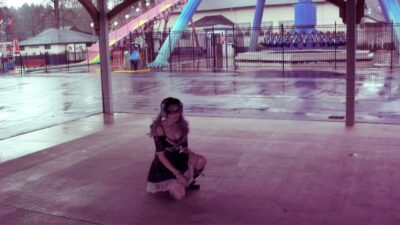
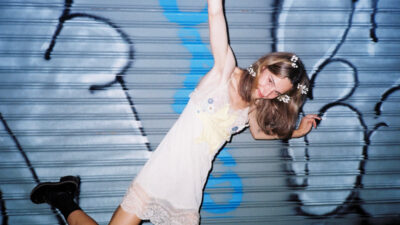
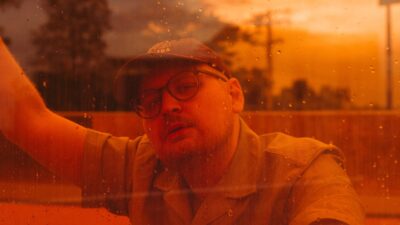
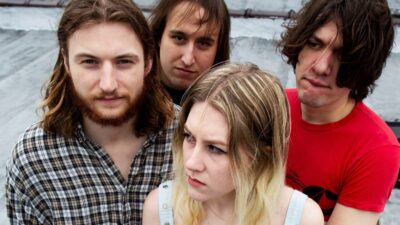
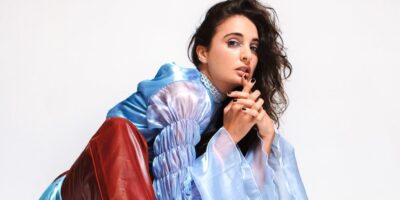
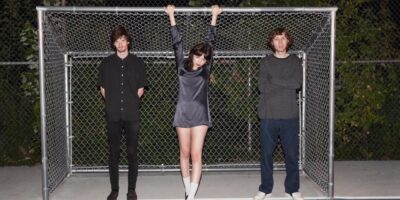
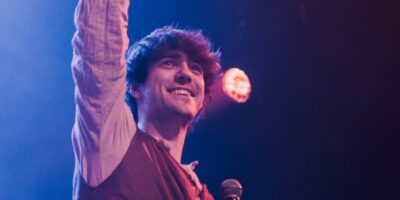
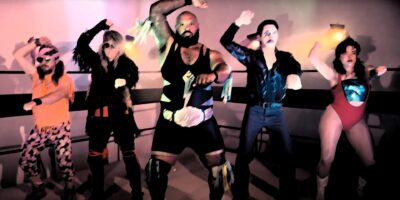
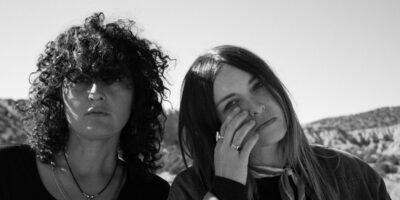
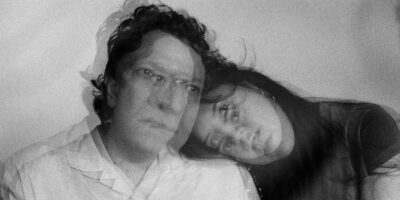




Comments